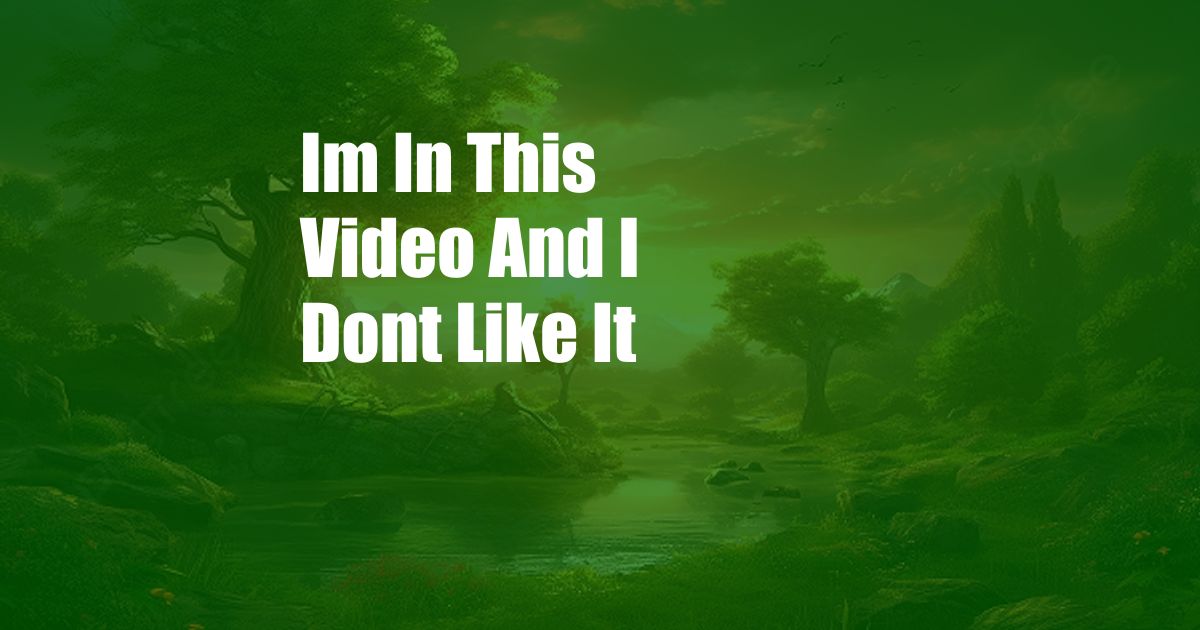
I’m in This Video and I Don’t Like It
As technology advances and social media platforms become more prevalent, it’s not uncommon to find videos of ourselves online that we may not have consented to or that we’re simply not happy with. This can be a disconcerting and even distressing experience, leaving us feeling vulnerable and exposed.
Whether it’s an unflattering or embarrassing video, one that portrays us in a way we don’t like, or even a video that we believe infringes on our privacy, it’s important to understand our options for addressing the situation. Here’s a comprehensive guide to help you understand your rights and take control of your online presence.
What to Do When You Find Yourself in a Video You Don’t Like
When you come across a video of yourself that you’re not happy with, the first step is to assess the situation. Consider the following:
- Identify the Platform: Determine where the video is hosted, whether it’s YouTube, Facebook, TikTok, or another platform.
- Review the Content: Carefully watch the video to understand its purpose and context. Identify specific parts that you find objectionable or problematic.
- Consider Your Options: Based on the platform and the nature of the video, consider your options for addressing the issue, such as contacting the uploader, filing a removal request, or exploring legal remedies.
Understanding Your Rights
Depending on the jurisdiction and the specific circumstances, you may have certain rights regarding videos of yourself that are posted online without your consent. These rights may vary depending on factors such as:
- Privacy Laws: Laws protecting personal data and privacy may prohibit the unauthorized recording or distribution of videos without consent.
- Copyright Laws: If you own the copyright to the footage or your likeness is used in a way that violates your copyright, you may have legal recourse.
- Defamation Laws: If the video is defamatory or portrays you in a false light, you may have grounds for a defamation claim.
Steps to Take to Remove the Video
If you’ve decided that you want to remove a video of yourself from an online platform, here are some steps you can take:
- Contact the Uploader: If possible, reach out to the person who uploaded the video and politely request its removal. Explain your reasons and be willing to negotiate if necessary.
- File a Removal Request: Most major platforms have processes in place for reporting and removing videos that violate their policies. Follow the platform’s guidelines for filing a removal request, providing clear and concise evidence to support your claim.
- Explore Legal Options: If other methods fail, you may consider consulting with an attorney to explore legal options such as cease-and-desist letters or injunctions. However, this should be considered as a last resort due to potential costs and uncertainties.
Tips and Expert Advice for Dealing with Objectionable Videos
Here are some tips and expert advice to help you navigate this situation effectively:
- Stay Calm: It’s understandable to feel upset or frustrated, but it’s crucial to approach the situation calmly and rationally.
- Document the Video: Take screenshots or make a copy of the URL to preserve evidence of the video’s existence.
- Seek Support: If the situation is causing you distress or anxiety, reach out to a trusted friend, family member, or mental health professional for support.
- Be Patient: Removing a video from an online platform can take time. Be patient and persistent in pursuing your goal.
FAQs on Videos of Yourself You Don’t Like
- Q: What should I do if I’m a minor and there’s a video of me online that I don’t like?
A: If you’re under the age of 18 and you’re concerned about a video of yourself online, reach out to a trusted adult or contact the platform directly for assistance.
- Q: How can I prevent videos of myself from being posted online without my consent?
A: Use strong privacy settings on social media platforms, be cautious about who you share videos with, and consider watermarking your videos with your name or logo.
- Q: What are the potential consequences of posting a video of someone without their consent?
A: Depending on the circumstances, posting a video of someone without their consent could result in privacy violations, copyright infringement, or even defamation.
Conclusion
Finding yourself in a video online that you’re not happy with can be a distressing experience. However, by understanding your rights, exploring your options, and following the steps outlined in this guide, you can take control of the situation and protect your online presence. Remember that you’re not alone, and there are resources available to help you navigate this challenging issue.
Are you interested in learning more about online privacy and your rights regarding videos of yourself? Share your thoughts and questions in the comments section below.